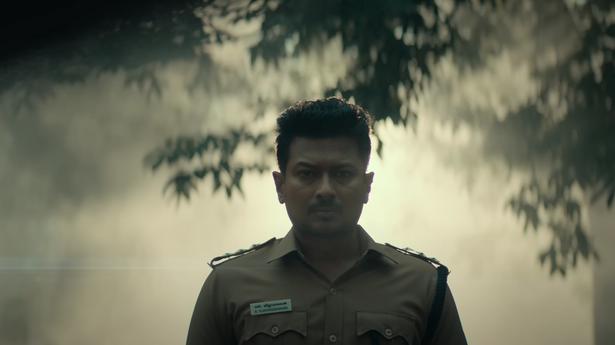
‘Nenjuku Needhi’ movie review: Udhayanidhi’s film is a more political, yet less affecting remake of ‘Article 15’
The Hindu
The remake is well-adapted to suit the social milieu of Tamil Nadu, but doesn’t quite immerse you into its world like its original
Anubhav Sinha’s Article 15, when it was released three years ago, was lauded for being one of the rare mainstream Hindi films to discuss the issues of caste. It also faced a major criticism: projecting an upper caste police officer, Ayan Ranjan (played by Ayushmann Khurrana), as the saviour of Dalits. The film also has a young Dalit revolitionary, Nishad (Mohammed Zeeshan Ayyub), who gets a few heroic moments. But the film undoubtedly takes the point of view of officer Ranjan. We see him toiling for justice by even putting his job on the line and getting his hands dirty (even literally by wading through swamps).
While the protagonist in Article 15 is clearly identified as an upper caste, his counterpart’s caste in the Tamil remake, Nenjuku Needhi, is not made apparent. We get to know that officer Vijayraghavan (Udhayanidhi Stalin) is a suave, English-speaking officer who has studied abroad. One of his subordinate officers ask him, “Is Vijayraghavan your full name?” trying to find out. Later, another officer claims he must be from an upper-caste background. But we do not know for sure.
By not revealing the protagonist’s caste, Arunraja Kamaraj, who has helmed this remake, not only steers clear from the ‘savarna-saviour’ criticism but also establishes the milieu, which is vastly different from the one we saw in Article 15.
In fact, the contrast of these two worlds is one of the most interesting things about the remake. Unlike Lalgaoon (the fictional town in Uttar Pradesh), we do not see people identifying others’ caste by their surname. Because, thanks to the social reform movements in Tamil Nadu, even in a village in Pollachi, where the remake is set, caste is absent from people’s names. Yet, it exists everywhere.
A large steel pot of rice is thrown away in a school because it is cooked by a Dalit. The statues of Ambedkar and Periyar are caged because of potential caste riots. Police officers, ignorant of the manual scavenging ban, try to call people from the oppressed caste to clean the overflowing police station sewers. A CBI official does not drink water brought by a constable wearing a green wrist thread. Another police officer calls them ‘ adhunga’ instead of ‘ avanga’, stripping them of their humanity. An upper caste influential contractor sexually abuses and murders minor Dalit girls just because they asked for a hike of Rs 30. Arunraja shows all ranges of caste violence: from the subtle to the extreme.
As the upright Vijayraghavan, Udhayanidhi (who is also a politician now), delivers several progressive and politically relevant messages without being cloyingly preachy; they mostly fit in with the story.
His characterisation, however, is a little confusing.

‘Love Scout’ K-Drama review: Han Ji-min and Lee Jun-hyuk lead a mature, refreshing workplace romance
‘Love Scout K-Drama’ review: A refreshing, mature workplace romance












